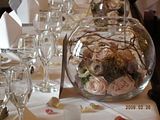
Flower
pollen-flowers posted a photo

twisted willow for dramatic effect - gallery4023.jpg

 This Flower, Unique, Because Have The Heart Shape, And Fortunately I Have A Moment To Capture It :)
This Flower, Unique, Because Have The Heart Shape, And Fortunately I Have A Moment To Capture It :) 
White and ample flower
pollen-flowers posted a photo

tea light holders as vases for rose buds - gallery4219.jpg
beetography
DSCN1479.jpg
I was chatt ing about Chelsea with friends last weekend and someone asked me this very question. It got me thinking about the show gardens. What are the designers hoping to achieve? Are they just showing off their skills? Are they trying to teach us something with their gardens or are they just entertainment?
I like to think of show gardens as being the Paris catwalks of the garden world - they're not something we would ever be able to afford or live up to, but those exquisitely executed creations stimulate our imaginations. They make us look at our own familiar beds and borders with new eyes, they shake us out of our comfortable complacency and springtime trips to the local garden centre.
For me, there's always something to take home - like a gorgeous new planting combination - I was so excited by roses with grasses when I first saw it, or a clever way to prune a tired shrub into an elegant, sculptural beauty. For those of us who need to know these things, show gardens give us a preview of what's going to be in fashion. There's a collective subconscious that decrees that this season we shall all want native plants, preferably edible and grown vertically, forget bananas - exotics are so passe. I heard that decking was planned in one of the gardens - is it making a comeback already? Of course there are several gardens with a message - and I'm looking forward to learning about rain gardens and seeing them in action, but I'm also hoping for a bit of pure entertainment as well.
Gilly Brennan, horticultural researcher
Info from:
Private Club



No comments:
Post a Comment